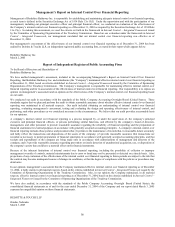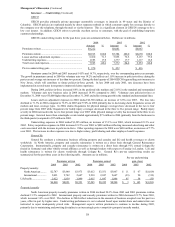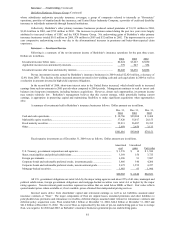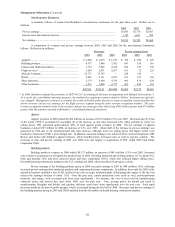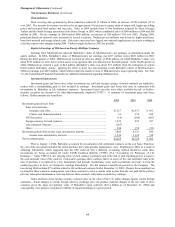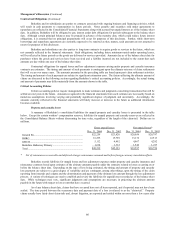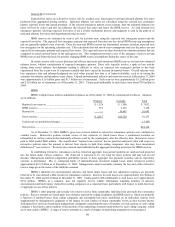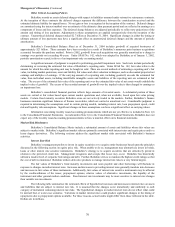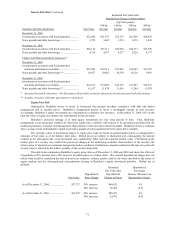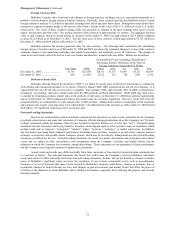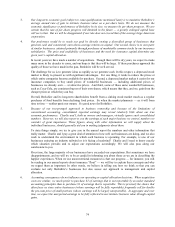Berkshire Hathaway 2004 Annual Report Download - page 67
Download and view the complete annual report
Please find page 67 of the 2004 Berkshire Hathaway annual report below. You can navigate through the pages in the report by either clicking on the pages listed below, or by using the keyword search tool below to find specific information within the annual report.
66
Management’s Discussion (Continued)
Contractual Obligations (Continued)
Berkshire and its subsidiaries are parties to contracts associated with ongoing business and financing activities, which
will result in cash payments to counterparties in future periods. Notes payable and securities sold under agreements to
repurchase are reflected in the Consolidated Financial Statements along with accrued but unpaid interest as of the balance sheet
date. In addition, Berkshire will be obligated to pay interest under debt obligations for periods subsequent to the balance sheet
date. Although certain principal balances may be prepaid in advance of the maturity date, which could reduce future interest
obligations, it is assumed that no principal prepayments will occur for purposes of this disclosure. Further, while short-term
borrowings and repurchase agreements are currently expected to be renewed as they mature, such amounts are not assumed to
renew for purposes of this disclosure.
Berkshire and subsidiaries are also parties to long-term contracts to acquire goods or services in the future, which are
not currently reflected in the financial statements. Such obligations, including future minimum rentals under operating leases,
will be reflected in future periods as the goods are delivered or services provided. Amounts due as of the balance sheet date for
purchases where the goods and services have been received and a liability incurred are not included to the extent that such
amounts are due within one year of the balance sheet date.
Contractual obligations for unpaid losses and loss adjustment expenses arising under property and casualty insurance
contracts are estimates. The timing and amount of such payments is contingent upon the ultimate outcome of claim settlements
that will occur over many years. The amounts presented in the preceding table are based upon past claim settlement activities.
The timing and amount of such payments are subject to significant estimation error. The factors affecting the ultimate amount of
claims are discussed in the following section regarding Berkshire’ s critical accounting policies. Accordingly, the actual timing
and amount of payments may differ materially from the amounts shown in the table.
Critical Accounting Policies
Certain accounting policies require management to make estimates and judgments concerning transactions that will be
settled several years in the future. Amounts recognized in the financial statements from such estimates are necessarily based on
numerous assumptions involving varying and potentially significant degrees of judgment and uncertainty. Accordingly, the
amounts currently reflected in the financial statements will likely increase or decrease in the future as additional information
becomes available.
Property and casualty losses
A summary of Berkshire’ s consolidated liabilities for unpaid property and casualty losses is presented in the table
below. Except for certain workers’ compensation reserves, liabilities for unpaid property and casualty reserves are reflected in
the Consolidated Balance Sheets without discounting for time value, regardless of the length of the claim-tail. Dollars are in
millions.
Gross unpaid losses Net unpaid losses*
Dec. 31, 2004 Dec. 31, 2003 Dec. 31, 2004 Dec. 31, 2003
General Re........................................................................... $22,258 $23,820 $20,056 $20,787
BHRG.................................................................................. 16,235 15,769 13,132 12,513
GEICO................................................................................. 5,112 4,492 4,867 4,282
Berkshire Hathaway Primary .............................................. 1,614 1,312 1,542 1,217
Total .................................................................................... $45,219 $45,393 $39,597 $38,799
* Net of reinsurance recoverable and deferred charges reinsurance assumed and before foreign currency translation effects.
Berkshire records liabilities for unpaid losses and loss adjustment expenses under property and casualty insurance and
reinsurance contracts based upon estimates of the ultimate amounts payable under the contracts related to losses occurring on or
before the balance sheet date. Depending on the type of loss being estimated, the timing and amount of property and casualty
loss payments are subject to a great degree of variability and are contingent, among other things, upon the timing of the claim
reporting from insureds and cedants and the determination and payment of the ultimate loss amount through the loss adjustment
process. A variety of techniques are used to establish and review the liabilities for unpaid losses recorded as of the balance sheet
date. While techniques may vary, significant judgments and assumptions are necessary in projecting the ultimate amount
payable in the future with respect to loss events that have occurred.
As of any balance sheet date, claims that have occurred have not all been reported, and if reported may not have been
settled. The time period between the occurrence date and payment date of a loss is referred to as the “claim-tail.” Property
claims usually have fairly short claim-tails and, absent litigation, are reported and settled within no more than a few years after


